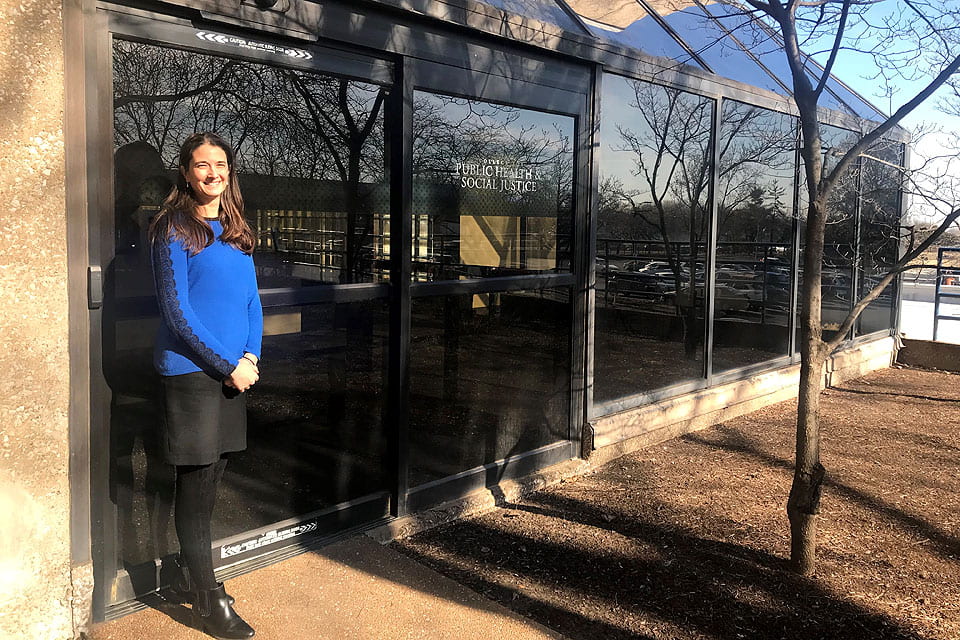Research in Action: Missouri Church Group Mobilizes to Help Women with Menstrual Hygiene Needs After Seeing SLU Study
Maggie Rotermund
Senior Media Relations Specialist
maggie.rotermund@slu.edu
314-977-8018
Reserved for members of the media.
Just a month after a Saint Louis University researcher published a study finding low-income people with periods face challenges accessing basic menstrual supplies, a Missouri church group decided to act to improve conditions in their own community.
In one of the first needs assessments of its kind, Anne Sebert Kuhlmann, Ph.D., MPH, associate professor of behavioral science and health education at Saint Louis University’s College for Public Health and Social Justice and her team, documented the difficulties that low-income people with periods face in accessing sanitary supplies. Their findings were published in the February issue of Obstetrics & Gynecology.
Sebert Kuhlmann’s study found that nearly two-thirds of the women her team surveyed and interviewed in St. Louis were unable to afford menstrual hygiene supplies like pads or tampons at some point during the previous year, and 21 percent of women lacked supplies monthly. Nearly half – 46 percent – of those surveyed could not afford to buy both food and period-related products during the past year.
“Adequate menstrual hygiene management is not a luxury,” Sebert Kuhlmann and her co-authors conclude in the study. “It is a basic need for all women and should be regarded as a basic woman’s right. Our failure to meet these biological needs for all women in the United States is an affront to their dignity and barrier to their full participation in the social and economic life of our country.”
The Sonlight Parish Presbyterian Women’s group, made up of women from Fredericktown, Ironton and Park Hills, Missouri, met in March and discussed Kuhlmann’s study. According to a news release sent to their local newspapers, the women felt they needed to take action.
“This information brought to our attention a need that we, as women, felt we had to address. While the article was written with data from the St. Louis area, we are confident this is also a concern for many women and young girls in our communities.”
Members of the Sonlight group will be stationed at the Presbyterian churches in Ironton, Fredericktown and Park Hills from 10 a.m. to noon on Saturday, Sept. 7, to accept donations of menstrual hygiene products. The donations will be distributed to local food pantries.
The women surveyed by Sebert Kuhlmann’s team reported that a key challenge in accessing period products stems from the products’ high cost and their inability to apply government benefits toward their purchase. Funds from Women, Infants, and Children Program (WIC) or Supplemental Nutrition Assistance Program (SNAP) can’t be used to buy period products.
The Sonlight group is just one example of a community accessing public health research to improve lives. On Saint Louis University’s campus, the SLU Project Period started in January to provide college students access to menstrual hygiene resources.
In St. Louis, the St. Louis Alliance for Period Supplies launched in March to raise awareness, distribute period products through an affiliation with the St. Louis Diaper Bank and advocate for legislative change. Dignity Period has partnered with the Jennings School District on a pilot project providing interested female students with reusable pads. Missouri Appleseed has worked with both the state and the city to get pads and tampons for incarcerated populations provided free of charge.
School districts in New Hampshire and the Boston area, both citing Sebert Kuhlmann’s research, will provide period products in middle and high schools this fall.
Sebert Kuhlmann’s work on this topic continues. She, along with colleagues Ellen Barnidge, Ph.D., MPH, associate professor of behavioral science and health education, and Enbal Shacham, Ph.D., associate professor of behavioral science and health education, are conducting a “women’s resources audit” in the City of St. Louis, examining product availability, cost and overall access.
The Saint Louis University College for Public Health and Social Justice is the only academic unit of its kind, studying social, environmental and physical influences that together determine the health and well-being of people and communities. It also is the only accredited school or college of public health among nearly 250 Catholic institutions of higher education in the United States.
Guided by a mission of social justice and focused on finding innovative and collaborative solutions for complex health problems, the College offers nationally recognized programs in public health, social work, health administration, applied behavior analysis, and criminology and criminal justice.


















